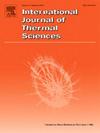Research on the influence of cross-distance and cross-phase angle on thermodynamic performance of cross wavy channels
IF 4.9
2区 工程技术
Q1 ENGINEERING, MECHANICAL
International Journal of Thermal Sciences
Pub Date : 2025-05-08
DOI:10.1016/j.ijthermalsci.2025.109975
引用次数: 0
Abstract
It is an energy-saving measure for micro gas turbine to recycle waste heat by using recuperator. The cross wavy recuperator is widely used with the compact and efficient characteristics. Although there have been related studies on its geometric size, the influence of cross form on its thermodynamic performance has not been paid attention to. Therefore, this research innovatively studies the influence of two geometric parameters of the cross form on the thermodynamic performance by the numerical simulation. The results show that only changing the cross-distance can increase the Nusselt number by 3.24 % and the comprehensive performance index by 2.09 % maximally. Only changing the cross-phase angle can decrease the channel resistance and increase the comprehensive performance index by 3.77 % maximally. Based on the sample data of two cross parameters, the comprehensive performance index under each working condition is increased averagely by 12.06 %. Moreover, the correlations of Nusselt number and friction factor are obtained. The average calculation errors of the formulas and numerical simulation are 3.75 % (Nusselt number and 2.47 % (friction factor), which proves the accuracy of the correlation formulas and can provide help for the optimization and design of the cross wavy recuperator.

交叉距离和交叉相位角对交叉波通道热力学性能影响的研究
利用回热器回收余热是微型燃气轮机的一项节能措施。交叉波式回热器具有结构紧凑、效率高的特点,得到了广泛的应用。虽然对其几何尺寸有相关的研究,但交叉形式对其热力学性能的影响尚未得到重视。因此,本研究创新性地通过数值模拟研究了十字形状的两个几何参数对热力学性能的影响。结果表明,仅改变交叉距离即可最大提高努塞尔数3.24%,综合性能指标提高2.09%。仅改变交相角就能最大限度地降低通道电阻,使综合性能指标提高3.77%。基于两个交叉参数的样本数据,各工况下的综合性能指标平均提高12.06%。得到了摩擦系数与努塞尔数的相关关系。公式和数值模拟的平均计算误差分别为3.75%(努塞尔数)和2.47%(摩擦系数),证明了相关公式的准确性,可以为交叉波回热器的优化设计提供帮助。
本文章由计算机程序翻译,如有差异,请以英文原文为准。
求助全文
约1分钟内获得全文
求助全文
来源期刊

International Journal of Thermal Sciences
工程技术-工程:机械
CiteScore
8.10
自引率
11.10%
发文量
531
审稿时长
55 days
期刊介绍:
The International Journal of Thermal Sciences is a journal devoted to the publication of fundamental studies on the physics of transfer processes in general, with an emphasis on thermal aspects and also applied research on various processes, energy systems and the environment. Articles are published in English and French, and are subject to peer review.
The fundamental subjects considered within the scope of the journal are:
* Heat and relevant mass transfer at all scales (nano, micro and macro) and in all types of material (heterogeneous, composites, biological,...) and fluid flow
* Forced, natural or mixed convection in reactive or non-reactive media
* Single or multi–phase fluid flow with or without phase change
* Near–and far–field radiative heat transfer
* Combined modes of heat transfer in complex systems (for example, plasmas, biological, geological,...)
* Multiscale modelling
The applied research topics include:
* Heat exchangers, heat pipes, cooling processes
* Transport phenomena taking place in industrial processes (chemical, food and agricultural, metallurgical, space and aeronautical, automobile industries)
* Nano–and micro–technology for energy, space, biosystems and devices
* Heat transport analysis in advanced systems
* Impact of energy–related processes on environment, and emerging energy systems
The study of thermophysical properties of materials and fluids, thermal measurement techniques, inverse methods, and the developments of experimental methods are within the scope of the International Journal of Thermal Sciences which also covers the modelling, and numerical methods applied to thermal transfer.
 求助内容:
求助内容: 应助结果提醒方式:
应助结果提醒方式:


